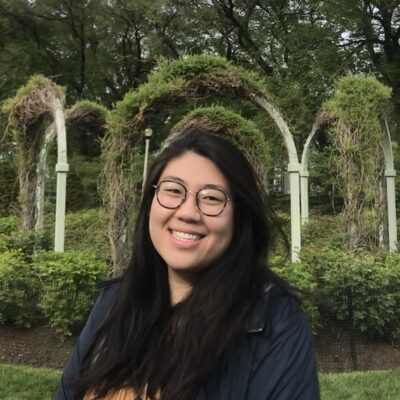Postdoc Spotlight: Lucinda Li

September 19, 2025
Lucinda Li is a postdoc in soil and crop science within the School of Integrative Plant Sciences from Brooklyn, New York. She earned her Ph.D. at the University of Michigan, Ann Arbor, and her research focuses on circular economies of carbon and nutrients. She is a recipient of a Postdoc Achievement Award for Excellence in Leadership as part of Cornell’s celebration of National Postdoc Appreciation Week 2025.
What is your area of research, scholarship, or work and why is it important?
Nutrient inefficiency in the food, energy, and water systems poses a critical risk for potentially irreversible environmental damage, with implications for food security, water quality, soil health, and climate change. My research advances circular economies of carbon and nutrients to align environmental sustainability with public health priorities by: 1) managing public health risks in waste valorization, 2) mitigating anthropogenic contributions to environmental nutrient flows, and 3) modeling the system impacts of a circular nutrient economy. Using a combination of experimental and computational approaches, I generate data and develop tools to inform decision-making for circular nutrient use that leads to more sustainable and equitable food, energy, and water systems.
What are the broader implications of this research, scholarship, or work?
Through research and outreach, I work toward improving resource use efficiency and reducing the impacts of food, energy, and water systems on climate change. I am especially interested in mitigating the indirect impacts of climate change on under-resourced communities, who are disproportionately affected by extreme weather events, environmental pollution, and resource volatility. In the face of these challenges, small-scale circular nutrient management strategies can help strengthen food sovereignty while expanding access to safe water and sanitation.
What does receiving a Postdoc Achievement Award mean to you?
I am honored to be nominated for and receive a Postdoc Achievement Award. This recognition reflects the invaluable mentorship of my adviser, Johannes Lehmann, the support of my colleagues in the Lehmann Lab, and the dedication of the students I have been privileged to work with. Their contributions make our research possible, and I am excited to see how their experiences in our lab will shape their future paths.
What hobbies or activities do you enjoy in your spare time?
I love trying out new hobbies and discovering different interests. Recently, I have been interested in gardening, going on scenic walks, and trying new cuisines.
Why did you choose Cornell?
I really appreciate the opportunities that Cornell offers to learn from leading scientists, collaborate with highly dedicated students, and build on the long-standing connections that Cornell has with local communities.
What is next for you?
I am dedicated to changing the way we view and handle waste from a material that should be discarded to one that can be transformed into valuable resources. I hope to expand on my work by translating academic research into support for communities and changes in industry and policy.
Do you have any advice for current graduate students?
In today’s challenging social and political climate, it is more important than ever to broaden our expertise and develop skills that extend beyond our own disciplines. Addressing the complex problems we face requires us to engage with perspectives from the social sciences, physical sciences, and humanities. As graduate students, it is easy to become absorbed in the bubble of our own research, but graduate school is also one of the best opportunities to pursue cross-disciplinary experiences that enrich our work and expand our impact.
